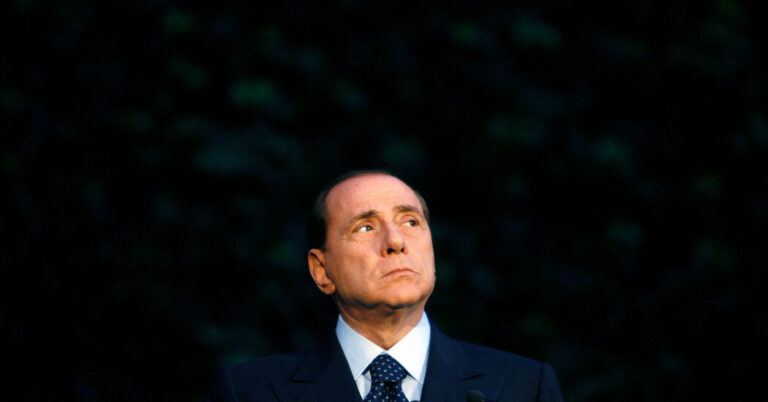
[ad_1]
ROME — Silvio Berlusconi, the brash media mogul who revolutionized Italian television with privately owned channels that he used to become the country’s most polarizing and prosecuted prime minister over multiple stints in office and an often scandalous quarter-century of political and cultural influence, died on Monday at San Raffaele hospital in Milan. He was 86.
His death was reported by multiple news outlets in Italy. No cause of death was given, but he was hospitalized last week as part of his ongoing treatment for chronic leukemia and other ailments.
To Italians, Mr. Berlusconi was constant entertainment — both comic and tragic, with more than a touch of off-color material — until they booed him off the stage. But he kept coming back. To economists, he was the man who helped drive the Italian economy into the ground. To political scientists, he represented a bold new experiment in television’s impact on voters. And to tabloid reporters, he was a delicious font of scandal, gaffes, ribald insults and sexual escapades.
A gifted orator and showman who sang on cruise ships as a young man, Mr. Berlusconi was first elected prime minister in 1994, after the “Bribesville” scandals, which had dismantled Italy’s postwar power structure. He famously announced that he would “enter the field” of politics to deliver business-minded reforms, a move that his supporters framed as a selfless sacrifice for the country but that his critics considered a cynical effort to protect his financial interests and secure immunity from prosecution related to his business affairs.
That first go in office collapsed quickly, but voters, many persuaded by his televised signing of a “Contract With Italians,” overwhelmingly chose him, Italy’s richest man, to lead the country again in 2001, this time as the head of Italy’s largest parliamentary majority since World War II.
That center-right governing coalition lasted longer than any Italian government had since the war. In 2005, he became prime minister again after a government reshuffle, then used his power to upend the electoral law to give himself a better shot at winning the next general election. He narrowly lost that bid, in 2006, but stayed at center stage and returned to power in snap elections in 2008.
His victory demoralized a generation of the left. Opponents were both obsessed with Mr. Berlusconi and utterly vexed by him, a politician who seemed to be made of electoral Teflon despite a raft of international faux pas, failures to deliver on pie-in-the-sky promises and the tanking of the Italian economy.
Liberal politicians, and the prosecutors he demonized as their judicial wing, watched in dismay as he used appeals and statutes of limitations to avoid punishment despite being convicted of false accounting, bribing judges and illegal political party financing.
His governments spent an inordinate amount of time on laws that seemed tailor-made to protect him from decades of corruption trials, a goal that some of his closest advisers acknowledged was why he had entered politics in the first place.
One law overturned a court ruling that would have required Mr. Berlusconi to give up one of his TV networks; others downgraded the crime of false accounting and reduced the statute of limitations by half, effectively cutting short several trials involving his businesses. He enjoyed parliamentary immunity, but in 2003 his government went further, passing a law granting him immunity from prosecution while he remained in office — in effect suspending his corruption trials.
Some of those laws were eventually ruled unconstitutional, and in 2009 the country’s highest court struck down the immunity law.
The damage of those corruption charges was then compounded by accusations that he paid for sex with an underage girl nicknamed Ruby Heart-Stealer. He was later acquitted, but the story was catnip for the global tabloid press. So, too, were reports that he held “bunga bunga” sex parties with women allegedly procured by a news anchorman on one of his channels and a former dental hygienist and showgirl who became a Milan regional councilwoman. Mr. Berlusconi maintained that these were merely elegant dinners.
The scandals incited large-scale protests by women. Even the Roman Catholic Church, an influential force in Italian politics that had often held its nose when it came to Mr. Berlusconi, signaled that enough was enough.
But what really dislodged Mr. Berlusconi from power was not a sudden ethical awakening in Italy or a tide of intolerance toward his extracurricular habits, but the unspinnable fact of Europe’s debt crisis and the lack of confidence among European leaders and debtholders that he could lead the country out of it.
By the time he finally resigned, in 2011, amid a fractured conservative coalition and general national malaise, a good deal of damage seemed to have been done. Many analysts held him responsible for harming Italy’s reputation and financial health and considered his time in power a lost decade that the country had struggled to recover from ever since.
Mr. Berlusconi was much more than his time in office, the policies he introduced or the allies he backed.
His often outrageous, norm-warping and personally sensational approach to public life, which became known as Berlusconism, made him the most influential Italian politician since Mussolini. He transformed the country and offered a different template for a leader, one that would have echoes in Donald J. Trump and beyond.
A full obituary will be published shortly.
[ad_2]